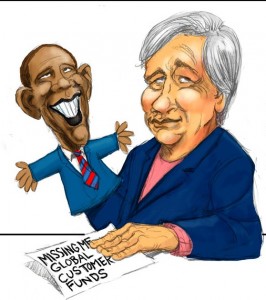The sudden dramatic collapse in the price of oil could cost trillions of dollars in oil derivative losses; and the FDIC could be liable, following repeal of key portions of the Dodd-Frank Act last weekend. That means taxpapers will pay for mistakes the banks made — yet again.
Some have argued that the small section of Dodd-Frank that was repealed when the budget was passed came to not very much. But why then did Jamie Dimon of JP Morgan Chase and President Obama lobby lawmakers to vote for the bill.
Ellen Brown writes: Quibbling over a mere 5% of the derivatives business sounds like much ado about nothing, but Jamie Dimon and the president evidently didn’t think so. Why?
Under Dodd Frank, FDIC-insured banks were not allowed to put depositor funds at risk for their bets on derivatives, with certain broad exceptions. At FDIC insured banks, interest rate, currency, gold/silver, credit derivatives referencing investment-grade securities, and hedges werepermissible activities within an insured depositary institution. Those not permitted included “equity, some credit and most commodity derivatives.”
A fraction, but a critical fraction, as it included the banks’ bets on commodities. Five percent of $280 trillion is $14 trillion in derivatives exposure – close to the size of the existing federal debt. $3.9 trillion of this speculation is on the price of commodities.
Among the banks’ most important commodities bets are oil derivatives. An oil derivative typically involves an oil producer who wants to lock in the price at a future date, and a counterparty – typically a bank – willing to pay that price in exchange for the opportunity to earn additional profits if the price goes above the contract rate. The downside is that the bank has to make up the loss if the price drops.
The drop in the price of oil by over $50 a barrel was completely unanticipated and outside the predictions covered by the banks’ computer models. The drop could cost the big banks trillions of dollars in losses. And with the repeal of the Lincoln Amendment, taxpayers could be picking up the bill.
It may well be that the head of JPMorgan Chase, the President’s personal banker, wanted his losses covered and that’s what he got when the budget was passed. Jamie Dimon got the public to pay again.

